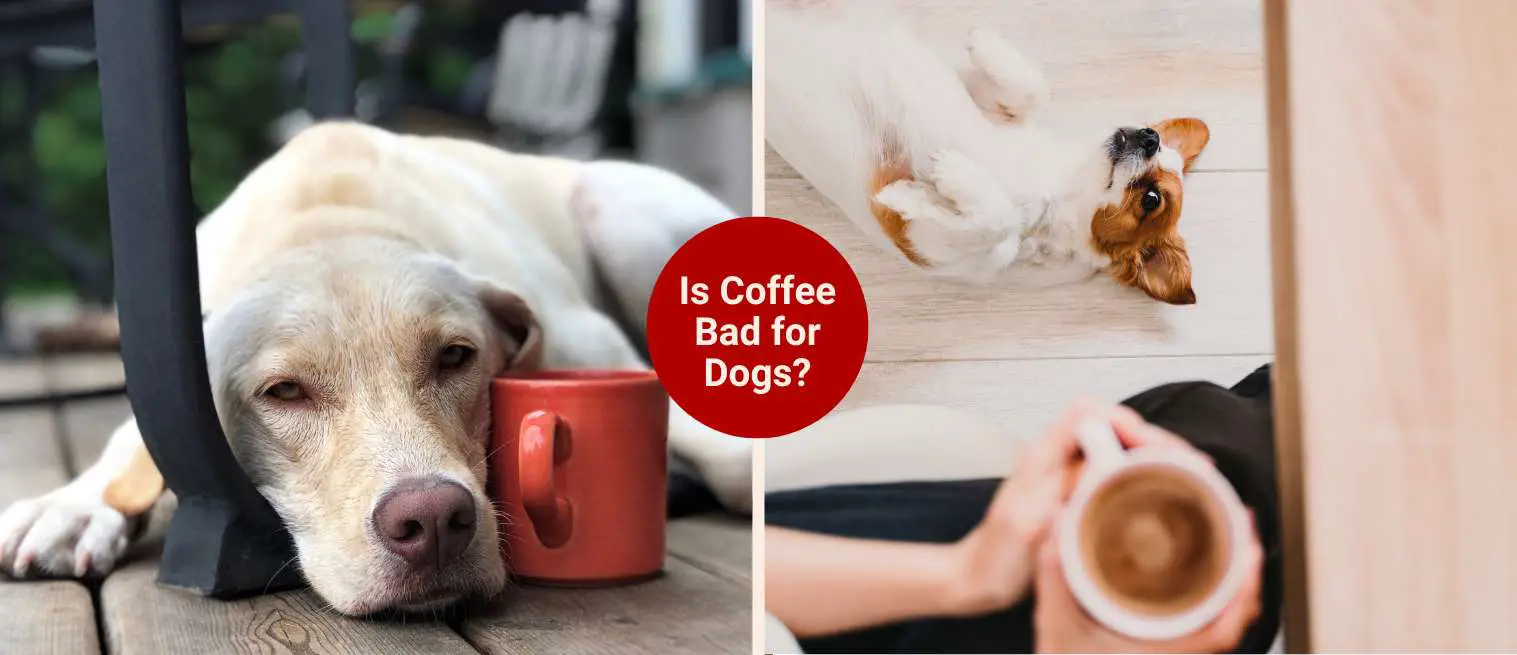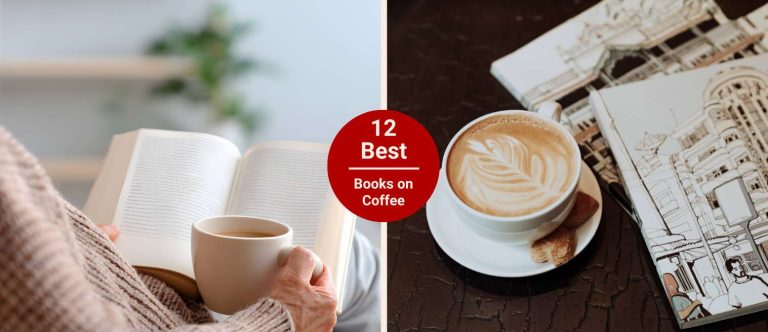Is Coffee Bad for Dogs? What Every Pet Owner Should Know
Did you know that the median lethal dose of caffeine for dogs is around 140 mg per kilogram? That’s a few sips for a tiny pup like a Chihuahua or Toy Poodle.
This statistic always blows my mind, because we think of coffee as harmless to ourselves. But for our furry friends, it can be downright dangerous.
I don’t have a dog, but over the years I’ve helped quite a few friends who do. They’d laugh about the weird stuff their pets grabbed off the counter like onions or grapes.
However, then one day they looked at me and said, “Wait… do you think coffee could be bad for dogs?” And since I write a blog about safe home habits, it really hit home. I quickly realized, “yes, coffee bad for dogs isn’t just a rumor.”
So in this guide, I’ll walk you through why coffee is toxic to dogs, how much they can safely tolerate, the dangerous signs to look for, and what to do if your pup ever finds itself in a coffee mishap. By the end, you’ll know how to protect your dog.
Key Takeaways
- Coffee is toxic to dogs – even small amounts can cause caffeine poisoning.
- Tiny breeds are most at risk – just a sip or two can be dangerous for Chihuahuas, Yorkies, or Toy Poodles.
- Symptoms to watch for – restlessness, vomiting, rapid heartbeat, tremors, or seizures.
- If your dog drinks coffee, act fast – call your vet or a pet poison hotline right away, don’t wait.
- Safer alternatives exist – stick to fresh water, dog-safe herbal teas, or special caffeine-free “dog coff
Why Is Coffee Bad for Dogs?
I’ve had friends who laughed it off when their pup licked a bit of latte foam, but the truth is even small amounts can be risky. The reason is that dogs process caffeine way differently than we do, and that’s what makes it dangerous.
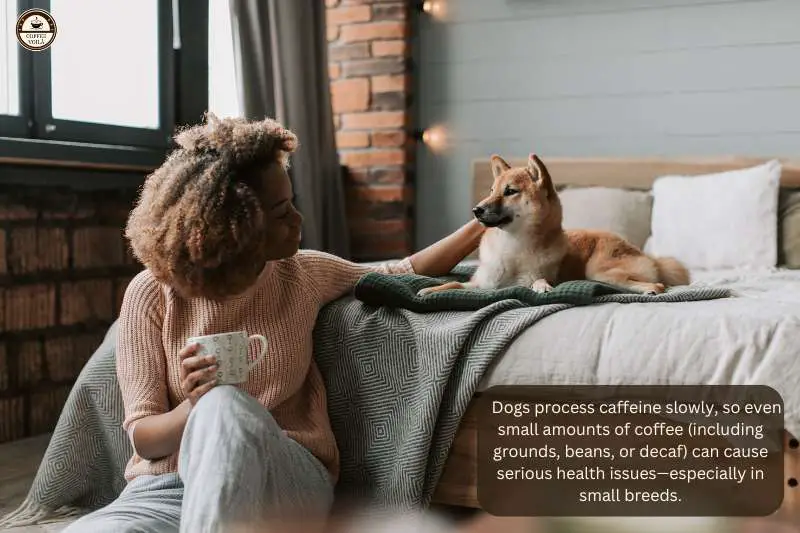
Coffee Contains Caffeine, a Stimulant Toxic to Dogs
Caffeine might be our morning lifesaver. But for dogs, it’s basically poison. It speeds up their nervous system and heart rate to unsafe levels.
Imagine your dog suddenly panting, pacing, and unable to calm down. That’s the caffeine kicking in. In high enough doses, it can lead to seizures or even collapse.
Dogs Metabolize Caffeine Much Slower Than Humans
Here’s something most people don’t realize: while you and I burn through caffeine in a few hours, dogs take way longer.
In other words, it lingers in their system, building up toxicity. A sip of coffee for us is nothing. However, for a small dog, it’s like chugging three energy drinks back-to-back.
Even Small Amounts Can Cause Health Issues
People always assume it takes a whole cup to do harm, but nope. A couple of licks of iced coffee, or a mouthful of grounds from the trash, can trigger restlessness, vomiting, or worse.
The smaller the dog, the higher the risk. For instance, tiny breeds (think Chihuahuas, Yorkies, or Toy Poodles) can be in real danger from amounts you’d barely notice.
Coffee Grounds, Beans, and Brewed Coffee Are All Dangerous
Coffee grounds and beans pack the highest caffeine concentration, which makes them especially toxic if your dog gets into the trash or pantry.
Even decaf isn’t safe; it still has trace caffeine, plus the acidity can upset a dog’s stomach. Basically, if it’s coffee in any form, it’s off-limits for your pup.
How Much Coffee Is Toxic to Dogs?
This is where things get a little scary, because the “toxic dose” for dogs isn’t all that high. Often vets measure it by body weight, and the numbers might surprise you.
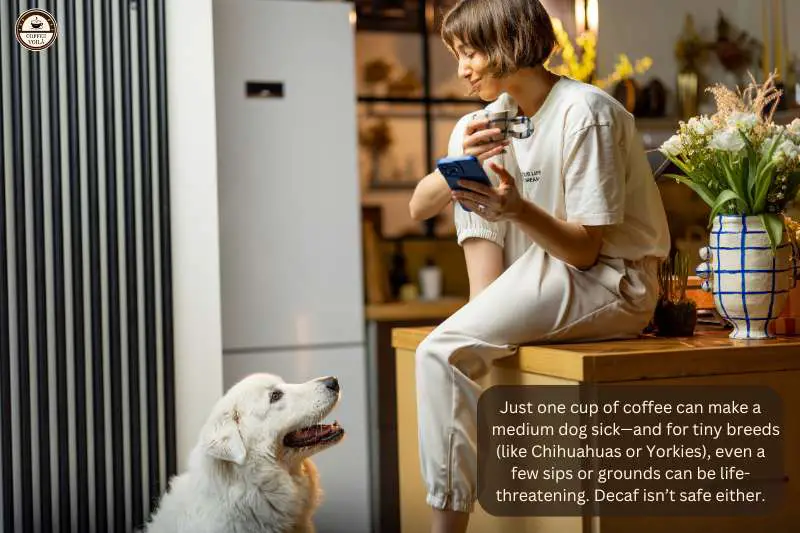
Toxic Caffeine Levels by Weight
On average, caffeine becomes toxic for dogs at around 20 mg per pound (40–50 mg per kg), and serious poisoning or fatal cases can occur closer to 75–100 mg per pound.
To put that into perspective, a standard 8 oz cup of brewed coffee has about 95 mg of caffeine. So a single cup could make a medium-sized dog very sick, and for a smaller pup it can be life-threatening.
Why Small Breeds Are at Greater Risk?
Big dogs like Labs or German Shepherds might tolerate a few accidental laps (though it’s still dangerous). However, tiny breeds like Chihuahuas, Yorkies, or Toy Poodles are much more vulnerable.
Just a sip or two could push them into the danger zone. This is why even “minor spills” on the floor need to be taken seriously if you’ve got a small dog around.
Brewed Coffee, Instant Coffee, and Coffee Grounds
Usually, brewed coffee has 95 mg per cup, instant coffee is a bit lower (60–80 mg), but coffee grounds and espresso are much more concentrated.
Grounds are especially dangerous because dogs sometimes dig them out of the trash and a spoonful can deliver a toxic dose. Also, cold brew and energy-style coffee drinks can pack in higher caffeine levels than you expect.
Why Decaf Coffee Is Not a Safe Alternative?
A lot of people assume decaf is harmless, but it still contains caffeine around 2–15 mg per cup. That’s less than regular coffee, but for small dogs it can still be risky.
Plus, decaf grounds and beans come with the same choking and digestive hazards as regular ones.
So the bottom line: there’s really no safe type of coffee for dogs.
Symptoms of Caffeine Poisoning in Dogs
The tricky thing about caffeine poisoning in dogs is that the symptoms can show up within 30–60 minutes and escalate quickly. So here are some things to look at:
| Symptom | What It Looks Like in Dogs | Why It Happens |
|---|---|---|
| Restlessness, hyperactivity, or agitation | Pacing, whining, unable to settle down | Caffeine overstimulates the nervous system |
| Rapid breathing or panting | Heavy, shallow breaths even at rest | Stimulant effect increases oxygen demand |
| Increased heart rate and high blood pressure | Fast heartbeat you can feel on the chest; gums may look pale | Caffeine raises adrenaline and puts strain on the heart |
| Vomiting and diarrhea | Repeated episodes, sometimes with undigested coffee grounds | The stomach and intestines react to toxins |
| Tremors, seizures, or collapse (severe cases) | Shaking, loss of control, fainting | Caffeine toxicity has reached the brain and muscles |
Note: If you notice even one or two of these signs after your dog got into coffee, don’t “wait and see.” Instead, call your vet immediately. The fact is, early treatment can make all the difference.
What To Do If Your Dog Drinks Coffee?
The moment you realize your dog just lapped up some coffee, it’s easy to panic. However, the trick is not to freak out but to move fast and smart.
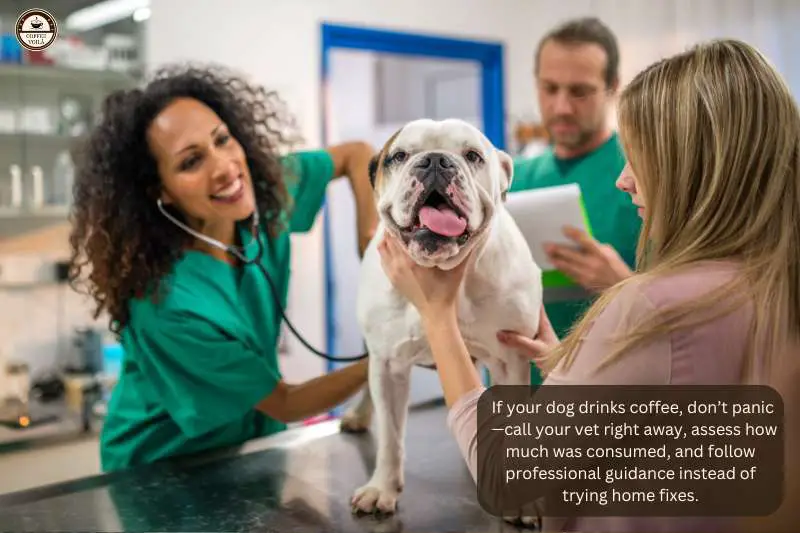
Stay calm and assess how much was consumed
First things first, try to figure out how much your pup drank. A few licks might not be as dangerous as half a cup, but either way, don’t brush it off.
Contact your veterinarian immediately
Even if the amount seems small, you should call your vet. They can calculate the risk based on your dog’s weight, what type of coffee it was (brewed, grounds, beans), and how much they think went down.
Call a pet poison hotline if needed
If your vet’s not available, many regions have animal poison hotlines you can reach out to for urgent advice.
In the U.S., that would be the ASPCA Animal Poison Control (888-426-4435) or Pet Poison Helpline (855-764-7661).
If you’re outside the U.S., check your country’s local veterinary emergency line or national animal poison service. And if all else fails, head straight to an emergency vet clinic.
Do not try to induce vomiting without veterinary guidance
I know the instinct is to “get it out,” but don’t grab the hydrogen peroxide unless your vet says so. In some cases, forcing vomiting can do more harm than good.
Possible treatments at the vet
If it’s serious, your vet may use activated charcoal to bind the caffeine, give IV fluids to flush it out, or prescribe meds to control heart rate and seizures. Sometimes they’ll keep your dog overnight for monitoring just to be safe.
Bottom line: the faster you act, the better the outcome. Even if it ends up being a false alarm, you’ll sleep better knowing you did the right thing.
Other Sources of Caffeine to Avoid
Coffee isn’t the only problem when it comes to caffeine. A lot of everyday foods and drinks we don’t even think twice about can be dangerous for dogs. So, here are a few sneaky sources to keep in mind:
Tea (black, green, matcha): While a warm cup of tea sounds harmless, it’s still loaded with caffeine. Even iced tea left on the table can cause issues if your pup decides to “taste test.”

Energy drinks: These are especially risky since they pack way more caffeine than coffee. Plus, added sugar or artificial sweeteners (like xylitol), and you’ve got a toxic cocktail for dogs.

Soda: Doesn’t matter if it’s cola or a “diet” version. The reason is that most sodas contain caffeine, and the combination of carbonation and sugar makes it a double whammy for stomach upset.
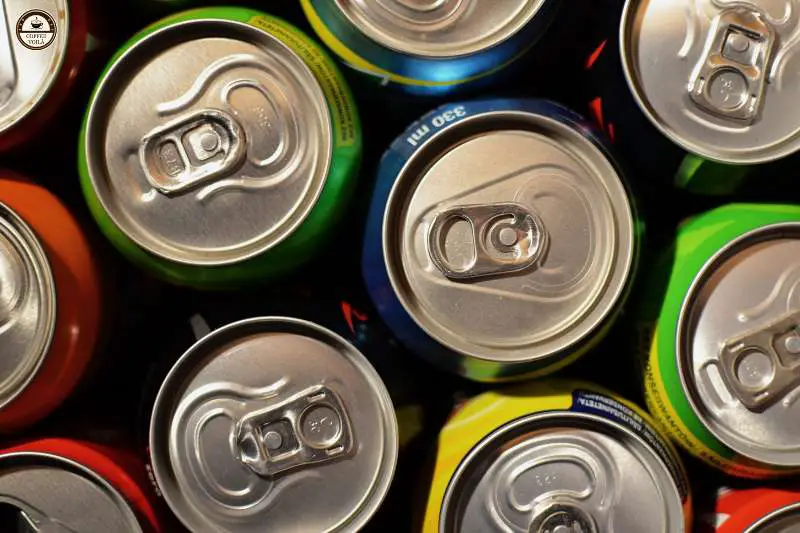
Chocolate and cocoa powder: Chocolate contains both caffeine and theobromine, which dogs can’t process. And dark chocolate and baking cocoa are the worst ones.
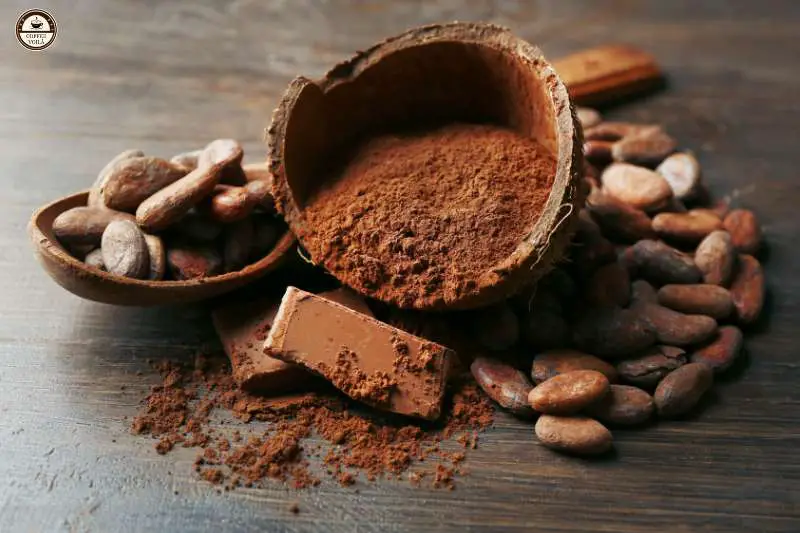
Certain medications (pain relievers, diet pills, etc.): Some over-the-counter and prescription meds use caffeine as a stimulant or appetite suppressant. If your dog accidentally gets into your pill bottle, that’s an emergency vet trip waiting to happen.
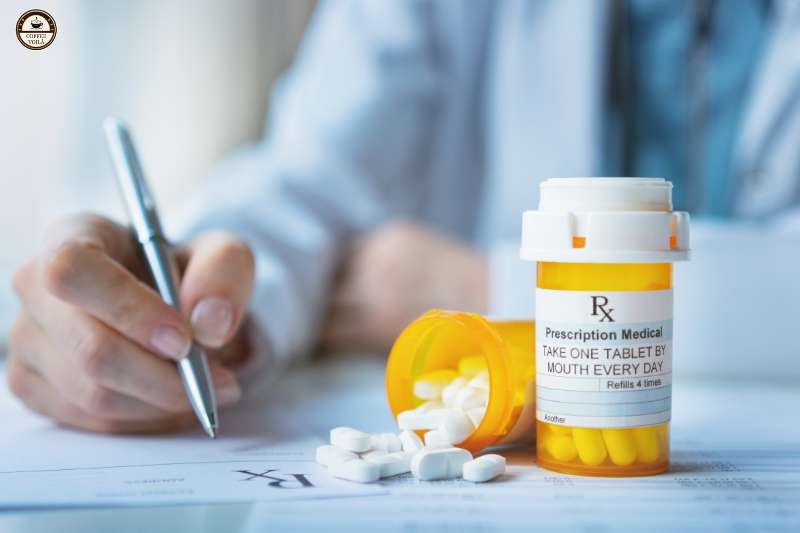
Safe Alternatives for Dogs
If you don’t like to feel guilty sipping your morning brew while your dog stares at you with those big “what about me?” eyes. The good news is that there are plenty of safe options. For example:
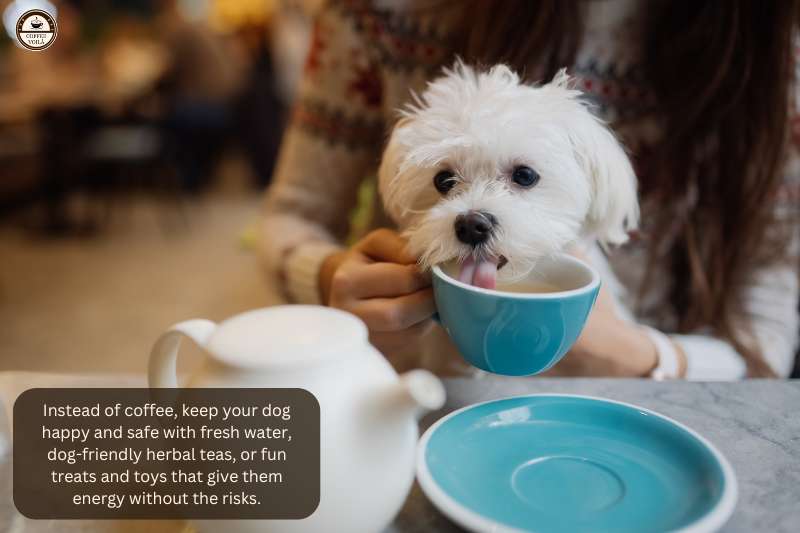
Fresh water (best option for hydration)
Honestly, nothing beats plain old water. It keeps your dog hydrated, supports digestion, and helps regulate body temperature. So, make sure your dog’s bowl is topped off with clean, cool water before you even start brewing your coffee.
Dog-safe herbal teas (like chamomile, in moderation)
A mild chamomile tea (completely cooled down, of course) can be soothing, especially if your pup tends to get anxious or has an upset stomach. Just stick to dog-safe herbs and avoid anything caffeinated or mixed with additives.
Nutritious treats and chew toys
Dogs don’t need caffeine to get a boost because they burn energy naturally. You can give them high-quality treats, puzzle feeders, or even a good chew toy to satisfy that craving for stimulation. Sometimes a game of fetch works better than anything in a cup.
Last Thoughts
Have you ever had a close call with your dog getting into coffee or something similar? Did you already know that even decaf isn’t safe, or was that news to you?
I’d love to hear your thoughts and experiences in the comments below.
And if you found this guide helpful, be sure to share it with other pet owners. Because the more we know, the healthier and happier our dogs will be.
Questions? We Have Answers.
Get answers to a list of the most Frequently Asked Questions.

